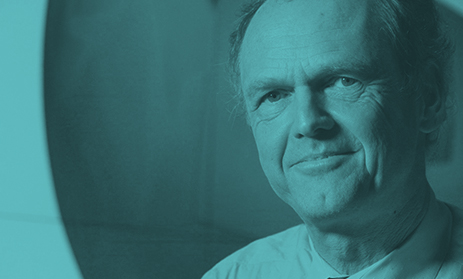Terry Hwa, professor of physics and of biology at the University of California, San Diego, now specializing in quantitative biology, draws inspiration from
an unexpected source: 19th-century thermodynamics, which bridged the gap between molecular interactions within a gas and its large-scale behavior. Hwa
seeks to do the same in biology, by first identifying the basic characteristics of cellular behavior and then elucidating the underlying molecular
interactions that cause them. This year, he and his group published a paper that takes an important step in that direction. "It's an appetizer for
everything else we want to do,"
he says.
Hwa is an investigator in the Simons Foundation Mathematical Modeling of Living Systems (MMLS) program. The MMLS program seeks to increase the role of theory in biological research, supporting scientists who study a broad range of biological issues, from embryonic development to evolutionary dynamics, by developing and employing sophisticated mathematical models to reveal fundamental concepts and analyze data.
Hwa's team tackled a long-standing question in oncology: Why do cancer cells, unlike most cells in the body, metabolize by anaerobic fermentation instead of the more efficient aerobic respiration, even in an oxygen-rich environment? This phenomenon, called the Warburg effect, has puzzled scientists for nearly a century.
Hwa and his colleagues found that for fast-growing cells, the model organism E. coli in this case, the protein cost of respiration is much higher than for
fermentation. "Even though respiration is an efficient way to generate energy on a per-carbon basis, the machinery required is costly," he says. The study
was the first to quantify the relative cost to cells of producing the proteins required for respiration
and fermentation.
Historically, some had viewed the Warburg effect as a defect in cancer cells' functioning, and hoped to discover what 'went wrong' that caused them to metabolize without oxygen. Hwa's research stands that notion on its head. "Many things can be messed up, but the ability of a cancer cell to grow must be robustly preserved," says Hwa. "Otherwise it would not be cancer." That is, it's highly unlikely that cancer cells' metabolic and growth processes are defective. Instead, his research suggests that a preference for fermentation may be a feature of fast-growing cells in general; therefore, preventing such cells from fermenting may be a way to slow their growth.
Hwa's research bridges the molecular and cellular levels: Instead of plumbing down to proteins and how they work together, his work focuses on functions the proteins are involved in — in this case, waste excretion and cell growth. After measuring their relationship, Hwa's team created mathematical models of cell growth and tested them by varying the environment and the cells' genetics. Their models successfully predicted the resulting changes in overall cellular behavior.
"Usually we think of biological phenomena as being complicated — and very difficult to describe in mathematical terms," Hwa says. "But in the case of the relationship between excretion and growth, we found a straight line. When there is a simple mathematical relation emerging from very complicated parts, that means there is something behind it."







